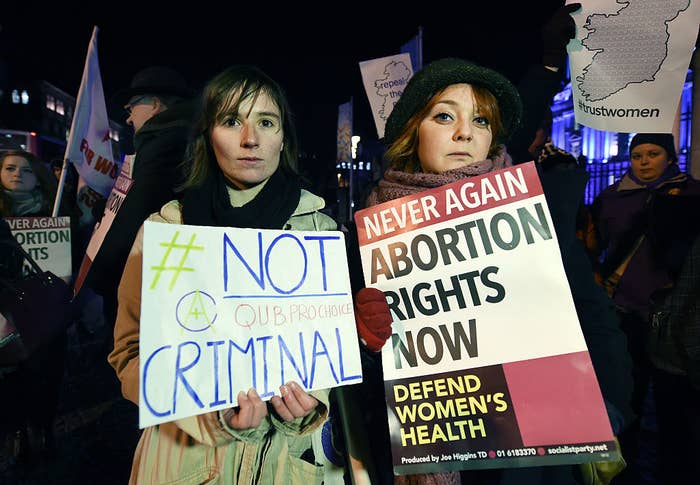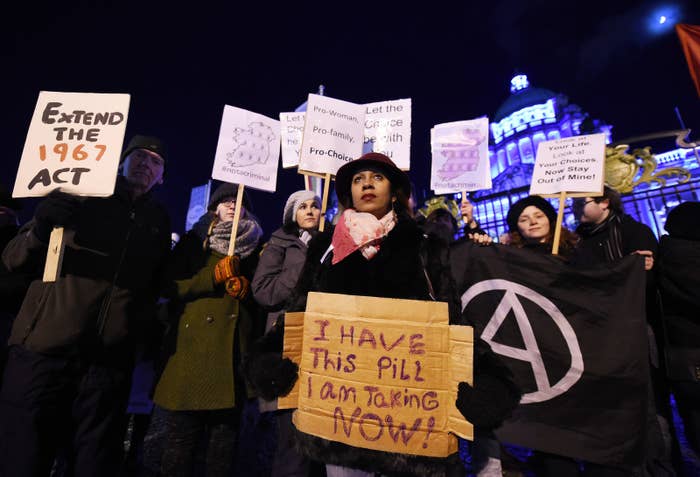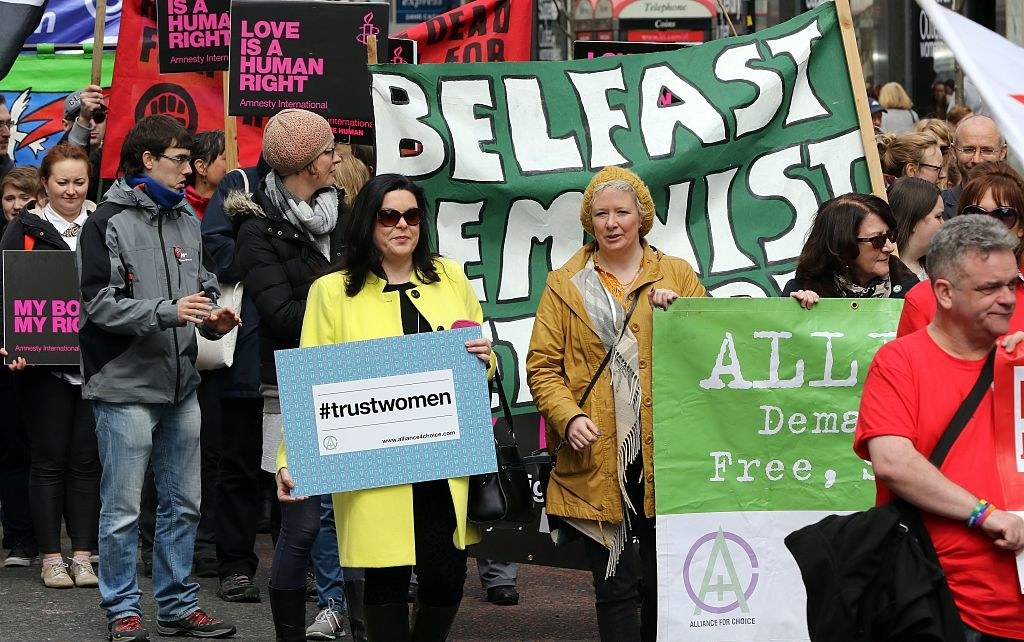
Women in Northern Ireland who can't afford to travel to England to legally access abortion are increasingly having to resort to putting their health and freedom at risk by purchasing abortion pills online, a leading women's reproductive charity has said.
"The number of women who are travelling to England for an abortion is falling, and the numbers requesting abortion pills online is increasing," Katherine O'Brien, a spokesperson for the British Pregnancy Advisory Service (BPAS), told BuzzFeed News.
Abortion is currently illegal in Northern Ireland unless the pregnancy is considered to be a direct threat to the mother's life.
O'Brien said that while some Northern Irish women will pay to travel elsewhere in the UK and get an abortion at a private clinic, many who can't afford to do so are using the internet to buy abortion pills – which is also illegal in Northern Ireland.
"This is something affecting women lacking financial means – vulnerable women who don’t have family support or feel like they can reach out to family members for money," she said.
The comments came following a supreme court hearing over whether the NHS will be required to pay for women in Northern Ireland to access free abortion services in England.
The supreme court challenge was brought by a girl, named only as "A", who, aged 15 in 2012, travelled to England to receive an abortion at a private clinic, and her mother, known as "B". The cost of the procedure and travel was £900, and they argued that the cost of the abortion itself should have been covered by the NHS, as it would be for women in the rest of the UK.

Last year the mother and daughter lost their case to get health secretary Jeremy Hunt to extend NHS abortion services to women from Northern Ireland, but they have won the right to appeal.
"I think it’s really worrying that against this backdrop of the secretary of state refusing to fund treatment, we are seeing women in Northern Ireland prosecuted," O'Brien said. "As we argue here as to who should be paying for what, women are putting their freedom at risk."
In April, a 21-year-old woman, who said she couldn't afford to travel to England for an abortion, was sentenced to three months in jail for taking abortion pills she purchased online. O'Brien worried that women's health was also compromised as a result of the legal restrictions around abortion pills in Northern Ireland.
While the pills are available from reputable sources such as online network Women on Web, which provides the same medication that can be obtained from registered clinics in England, Wales, and Scotland, it can be hard to guarantee the safety of drugs that are not purchased through official channels.
"Where there’s a demand people will provide drugs, and sometimes they won’t be
reputable and won’t be providing the medication that women think they’re ordering, which of course does carry a risk," O'Brien said.
What's more, because of the illegality of the drugs in Northern Ireland, women who experience adverse side-effects, from pills obtained from reputable sources or otherwise, are likely to avoid seeing a doctor.
"If women have any concerns about their symptoms and side-effects after taking this medication, because of the criminal law, they are afraid to seek medical help, and that’s really concerning," O'Brien added.
"Women are putting themselves in quite an isolated situation where they’ll be too afraid to go to a hospital if they have any concerns, and that’s really worrying.
"They should still be able to seek medical follow-up, but women in Northern Ireland would be too afraid to do that given the prosecutions that are going on."

The supreme court judgment on whether the Department of Health will be expected to pay for women from Northern Ireland to access NHS abortions is due at a later date that is yet to be announced.
During Wednesday's appeal hearing, lawyers for "A" and "B" said that women in Northern Ireland "find themselves in desperate and stressful practices and become second-class citizens in abortion".
Lawyers for the Department of Health suggested that women from Northern Ireland may be able to temporarily register with a GP in England in order to access abortion services on the NHS.
But O'Brien, who was present at the hearing, told us the court did not seem convinced by this argument. "When a supreme court judge is saying, ‘I couldn’t
do that, I don’t know how you expect a 15-year-old girl from Northern Ireland
to come across and achieve what I can’t do,' I find it quite spurious," she said.
Supreme court deputy president Lady Hale has indicated that women from Northern Ireland not being able to access the same health services as women in the rest of the UK is a breach of their human rights, and in November 2015, the high court in Belfast ruled that abortion restrictions in Northern Ireland were "incompatible with human rights".
Regardless of the outcome of the appeal, O'Brien said that BPAS will continue to campaign for women in Northern Ireland to have the same access to abortion as women in the rest of the UK.
"I think the secretary of state has made it very clear that he does not want to fund
these women," she said.
"These women are forced to travel, and the least that we can do is to pay for their treatment," she continued. "On top of having to pay for travel and accommodation, for them to have to pay for treatment just seems morally wrong."
The Department of Health told BuzzFeed News that it was unable to comment while the case was ongoing.
